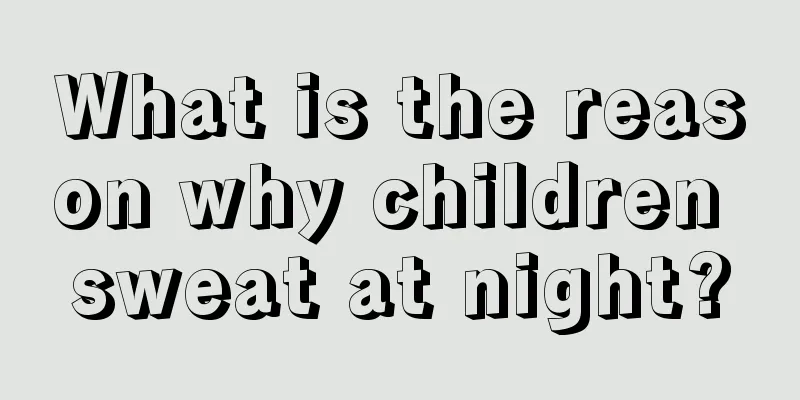What is the reason why children sweat at night?

|
Children always sweat when they sleep at night, which makes parents confused. In fact, sweating during sleep is a common problem for children. Sometimes it is not caused by weak constitution or some physical illness. For example, in the neonatal period, children have high metabolism and are prone to sweating. This is physiological hyperhidrosis. 1. It is common for babies to sweat during sleep, and it is not always a symptom of physical weakness or illness. Many parents believe that their children’s constant sweating is due to their weak constitution. In fact, a considerable number of children suffer from physiological hyperhidrosis. Physiological hyperhidrosis is more common in the head and neck, often occurring within half an hour after falling asleep, and sweating stops in about an hour. 2. In infancy and childhood, due to the active metabolism and active children, some of them cannot rest even after going to bed at night, so they may sweat on their heads after falling asleep. The so-called physiological hyperhidrosis refers to sweating during sleep when the child is well-developed, healthy, and has no disease. Parents are often accustomed to deciding the best environmental temperature for their children based on their own subjective feelings, and like to cover their babies with more blankets and keep them tightly covered. Because children's brain and nervous system are not yet fully developed and they are in the growth and development period, their body metabolism is very active. Coupled with the stimulation of overheating, they can only regulate normal body temperature by sweating to evaporate the heat in the body. 3. Some active children exercise a lot during the day and generate a lot of heat. The body is unable to dissipate the excess heat through sweating, so the heat accumulates in the baby's body, and the baby's body temperature can reach around 38°C at night. After the baby falls asleep, the heat generated decreases, the sensitivity of the sympathetic nerves decreases, and the body dissipates excess heat through sweating to maintain normal body temperature. 4. In addition, drinking milk, malted milk or eating chocolate before going to bed can also cause sweating in children. Some parents give their children milk, malted milk, etc. before they go to sleep. After the child falls asleep, the body produces a large amount of heat, which is mainly dissipated through sweating through the skin. In addition, too high room temperature or excessive warmth can also cause children to sweat while sleeping, which are all physiological sweating. 5. The weather is hot and humid in summer and the bedroom is poorly ventilated, so babies are more likely to sweat. This type of sweating is called "physiological sweating" in medicine. It usually occurs in the first half of the night when you just fall asleep, and the sweat gradually disappears after deep sleep. Parents do not need to worry too much about physiological sweating. This is just a physiological phenomenon during the baby's growth process. As the baby grows older, this phenomenon will gradually decrease. |
<<: Why do children keep blinking?
>>: Can ADHD in children heal itself?
Recommend
Will precocious puberty affect a child's height?
Nowadays, many children suffer from precocious pu...
How to give Yinzhihuang to babies
Most babies will show yellowing signs on their bo...
What are the precautions for baby head massage?
After the baby is born, parents will always pay a...
What is the reason for the child's left side abdominal pain
Although it is a hot summer, many diseases are oc...
What to do if your child has poor memory
Generally speaking, children have very good memor...
Can infants and young children eat millet porridge and precautions
Infants and young children need to supplement a l...
How to tie hair for little girls
Little girls love beauty very much, so they all w...
What are the height-increasing drugs for children?
Height is now very important for both men and wom...
What are the recipes for children with diarrhea?
Children may have diarrhea because they have eate...
Symptoms of a fever
Fever is not only caused by some colds, it may be...
What should parents do when their three-month-old baby sticks out his tongue?
The baby is born, and we become young parents. In...
Swollen lymph nodes under the armpit
The lymph nodes in the neck and armpits are the m...
The child keeps coughing
A child's body is in the golden stage of grow...
Can children's freckles really be removed?
Every parent hopes that their child will grow up ...
Nursing of intussusception in children
Generally, intestinal intussusception occurs more...









